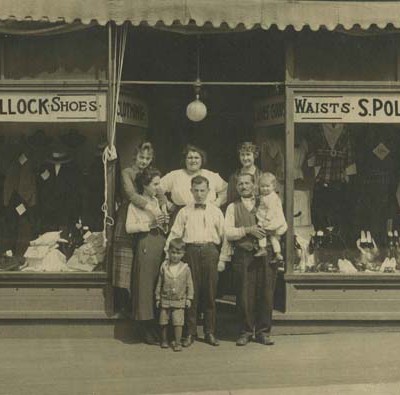
Samuel Pollock (1885-1948) immigrated to central Pennsylvania from Poland before 1914. While working at a general store in Altoona, Pa., he met an English immigrant named Lena Hollander (1888-1943), the bookkeeper for an Altoona wholesaler.
When Samuel and Lena Pollock married in 1914, Hollander’s employer gave the newlyweds $500 in credit and a tip about a vacant storefront in the nearby town of Gallitzin. They opened Pollock’s Department Store, which sold “Everything to Wear for Men, Women and Children.” The receipts from their first day of business were $11.03.
The department store was originally located in a small building on Main Street. In the mid-1930s, Samuel Pollock bought the bankrupt Weston Department Store and moved the business into the larger space. The Pollocks regularly traveled into Pittsburgh to patronize the Jewish wholesalers on Fifth Avenue and salesmen from those houses often stayed with the Pollocks when passing through central Pennsylvania. “We had an association with, I would say, ten or fifteen wholesalers on the Avenue,” his son Mel Pollock later said. “There was a personal, private association. My father and mother… treated them like members of the family. They weren’t treated so much as suppliers of merchandise.”
Samuel and Lena Pollock had two sons, Arthur and Melvin.
Mel Pollock (1918-2008) ran the store until about 1954, when he opened Young Fashions, a children’s store on the Miracle Mile in Monroeville. Mel and his wife Beverly King Pollock (1924-) were also local patrons of the arts. They started a concert series, taught painting in the public schools and established a local scholarship. Beverly King Pollock wrote a column called “The Maven,” which was originally published in the Jewish Chronicle and later syndicated nationally. The Pollocks had two daughters and two sons.
In the early 1990s, the Pollocks lost their sons to AIDS. They subsequently became active in Pittsburgh-area AIDS organizations, particularly in the Shepherd Wellness Community. They created a support group based out of Jewish Family & Children’s Services called “Jews with AIDS in the Family,” as well as educational and arts programming about AIDS designed specifically for the Jewish community. “Our decision to go public is that it is our only way to help Bobby, to keep him alive — and to help others. The more people don’t talk about it, the more they perpetuate the stigma,” Beverly Pollock told the Chronicle in 1992. She wrote a play in 2011 called Looking for Magic: A Modern Tale of Parents, Coming Out and AIDS.